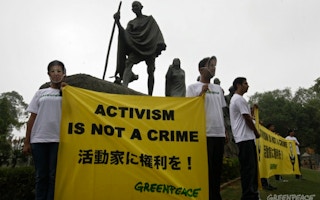For the first time in its history, environmental organisation Greenpeace International - known for its headline-grabbing campaigns - says that it may have to shut down its national organisation in India because it can’t access its own funds.
Greenpeace India has only one month to keep its operations afloat, the group said in a statement on Thursday. This is after the Indian government’s Ministry of Home Affairs (MHA) blocked the environmental group’s access to its domestic bank accounts last month on alleged violation of tax laws.
The MHA charged that the group has “prejudicially affected the economic interest of the state“, referring to its violation of the country’s Foreign Contribution Regulations Act, which include incorrectly reporting the amount of foreign contribution it has received as well as transferring the funds to other bank accounts without informing the authorities. Such acts, according to the MHA, hurt the Indian society’s “public interest”.
The campaign group said its local bank accounts are funded by donations from over 77,000 Indian citizens. Without access to these funds, the group cannot operate and may have to halt its campaigns on sustainable development, environmental justice and clean, affordable energy, it added.
“
Is it because we talked about pesticide-free tea, air pollution, and a cleaner, fairer future for all Indians?
Samit Aich, executive director of Greenpeace India
Samit Aich, executive director of Greenpeace India, told his 340 staff on Thursday to prepare for the shutdown of the organisation after 14 years of campaigning against many environmental violations in the country.
“We have one month left to save Greenpeace India from complete shutdown, and to fight the home ministry’s indefensible decision to block our domestic accounts,” Aich explained in a press statement.
The group accused Home Affairs minister Rajnath Singh of trying to silence Greenpeace because of its successful campaigns, calling the decision to block its funds as “strangulation by stealth”.
“He knows an outright ban is unconstitutional. We ask him to confirm that he is trying to close Greenpeace India and suppress our voice. His arbitrary attack could set a very dangerous precedent: every Indian civil society group is now on the chopping block,” added Aich.
Last year, Greenpeace faced the same financial scrutiny when the central bank delayed the transfer of the group’s foreign funds to its local bank accounts. The central bank had acted on the home ministry’s orders after the government’s Intelligence Bureau issued a report that accused foreign-funded NGOs of stalling the nation’s economic growth with their activities.
The case was overturned by the Delhi High Court, which ordered the funds to be released immediately.
Aich stressed that while they are preparing to legally challenge the home ministry’s latest move, the process may take time and the group’s cash reserves would not be sufficient to pay for staff salaries and office rent, thereby costing about 350 employees their jobs.
He pointed out: “Is it because we talked about pesticide-free tea, air pollution, and a cleaner, fairer future for all Indians?”
Last March, Greenpeace celebrated a legal victory in its campaign to stop coal mining in the Mahan forest in the state of Madhya Pradesh after the government withdrew the Mahan coal block from auction.
Apart from Greenpeace, foreign-funded charity group Ford Foundation is also included in the government’s ‘watchlist’ because its funds are alleged to have reached a political party and other organisations that do not fall under the NGO category.
Separately, the goverment announced last month the cancellation of licences of nearly 9,000 local NGOs for failing to file annual returns.
Priya Pillai, a senior campaigner with Greenpeace India who was banned from travelling overseas in March this year, commented: “I fear for my own future, but what worries me much more is the chilling message that will go out to the rest of Indian civil society and the voiceless people they represent….If Greenpeace India is first, who is next?”

















